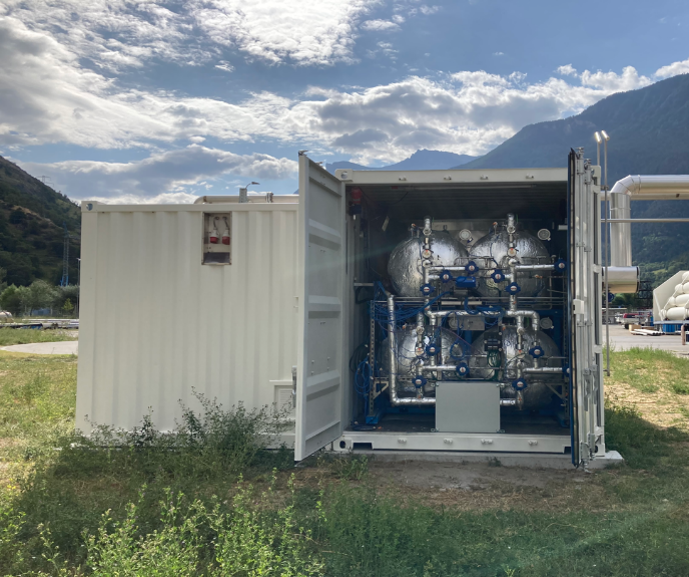Hydrogen compression is gaining prominence as a clean energy carrier. It offers a promising solution to the growing demand for sustainable energy. However, harnessing hydrogen’s potential requires effective storage and transportation methods. GRZ’s solid-state technology is applicable in many cases and greatly facilitiates hydrogen handling. In particular, this often eliminates the need for a compressor. However, in some applications, it necessary.
General overview of hydrogen compression #
Given its low density, hydrogen occupies a large volume in its natural gaseous state. Therefore, compression is needed to increase its pressure. Compressing hydrogen significantly reduces its volume, as is needed by some applications. This compressed hydrogen can then be used in various applications, e.g., to power hydrogen cars.
Technical aspects of hydrogen compression #
Different kinds of hydrogen compressors exist that are based on varying phyisical principles. Today, mechanical compressors are the most common devices used. They include reciprocating piston compressors, diaphragm compressors, and rotary screw compressors. Each type operates on slightly different principles, all achieve a hydrogen volume reduction throug an increase of its pressure.
Electrochemical compressors utilize proton exchange membranes to compress hydrogen. When an electric current passes through the membrane, hydrogen ions migrate, recombine into hydrogen molecules, and compress on the high-pressure side. This method offers high efficiency and purity, making it suitable for high-end applications like fuel cells.
Challenges in hydrogen compression #
Many challenges are related to materials and durability. Hydrogen embrittlement is a significant concern. This phenomenon occurs when hydrogen atoms diffuse into the used materials, making them brittle and prone to cracking. Therefore, the used materials must be carefully selected and often include stainless steel or advanced alloys. In addition, leakage and safety are a concern when using certain compression technologies. Hydrogen’s small molecular size makes it prone to leakage, posing safety risks due to its flammability. Advanced sealing technologies and regular maintenance are crucial to ensure system integrity and prevent accidents. Finally, cost and energy efficiency are relevant. Compressing hydrogen requires considerable energy, impacting the overall efficiency of hydrogen as an energy carrier.
Applicaitons and future prospects #
Hydrogen compression is critical in hydrogen refueling stations for vehicles that today require 350 bar(g) or 700 bar(g) hydrogen to refuel. Compressed hydrogen is also used in various industrial processes, e.g., petroleum refining and metal processing. The advancements of compression technologies can significantly improve these processes’ efficiency and environmental footprint. Innovations in compressor design and operation are essential for the continued evolution of the hydrogen industry.
Thermal hydrogen compressor HyCo #
GRZ Technologies contributed to solving the hydrogen compression challenge by pioneering the application of a novel technology based on a completely new operating principle: thermal hydrogen compression with the use of solid carrier materials. For this type of compression, GRZ uses solid hydrogen carrier materials. When saturated with hydrogen, their pressure increases exponentially as a function of the temperature. This setup allows compressing with (waste) heat. Moreover, the hydrogen part of the machine can be built without moving parts, so it is silent, vibration-less, leakage free, and requires only minimal to no maintenance. The technology greatly reduced the levelized cost of compression in many applications. An example of such a compressor is shown on the image below:

Apart from industrial applications, GRZ has also successfully introduced its compression technology for small applications in the laboratory: the FLEXI HyCo devices are sold worldwide by the leading hydrogen laboratory supplier KEP Technologies.
In conclusion, compresing hydrogen is pivotal in the hydrogen economy. Addressing the technical challenges associated with it will enable broader adoption of hydrogen as a clean energy source, contributing significantly to global sustainability efforts. Continued research and innovation in this field are essential to unlock hydrogen’s full potential and facilitate the transition to a greener future.





